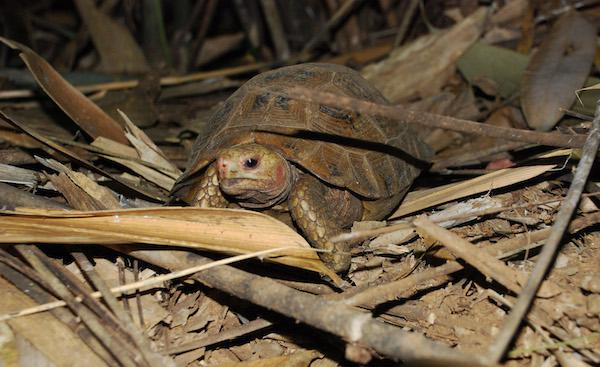Article featuring the project on Mongabay.
Chelonians for dinner: hunting threatens at-risk turtles and tortoises in India
11 Oct 2011 Palni Hills, India, Indian Sub-continent Reptiles | Turtles
Saplings, Stoves and Monitoring: A Multipronged Approach to Conserve the Critically Endangered Toad Skinned Frog Indirana phrynoderma in Western Ghats, India
The aim of the project is to formulate species action plans for the conservation of Indotestudo travancorica and Vijayachelys silvatica in the southern Western Ghats.

A Travancore tortoise in leaf litter. © A. Kanagavel.
The Cochin Forest Cane Turtle (Vijayachelys silvatica) and Travancore Tortoise (Indotestudo travancorica) are two threatened forest-dwelling chelonians restricted to the Western Ghats Hotspot in India. While V. silvatica is a rare, evolutionarily distinct habitat specialist, I. travancorica is widespread across the landscape occupying diverse habitats. These species are listed as Endangered and Vulnerable respectively in the IUCN Red List. Both V. silvatica and I. travancoria face numerous threats from forest-fires, elephant trampling to human consumption. What is however lacking is a population-level understanding across their entire range of occurrence and the relative extent of different threats. A study undertaken by the project leader in Chalakudy, Kerala State revealed that chelonian consumption was widespread in the region and is associated with numerous cultural beliefs. Preliminary data from this area also suggests that there could be a difference in perceptions of chelonian use between individuals from the states of Kerala and neighbouring Tamil Nadu. Failing to consider such issues could lead to designing strategies that would be ineffective at conserving these species.
The proposed study will assess the population and threats to these chelonians at protected and unprotected forested areas distributed in the states of Kerala and Tamil Nadu through field and interview surveys. The distribution and abundance of these species will be ascertained through visual encounter surveys at random plots and, data collected on environmental factors and morphology will further help understand the ecology of these lesser-known species. Local ecological knowledge and the expert opinion of researchers and forest department officials will also be integrated to inform the status of the species in the respective forested areas and explore the existence of cultural beliefs that inform and promote chelonian use. Thereby, this study will contribute to generating baseline information for formulating species action plans towards two lesser known chelonian fauna at neglected areas of the Western Ghats.
Article featuring the project on Mongabay.
Chelonians for dinner: hunting threatens at-risk turtles and tortoises in India